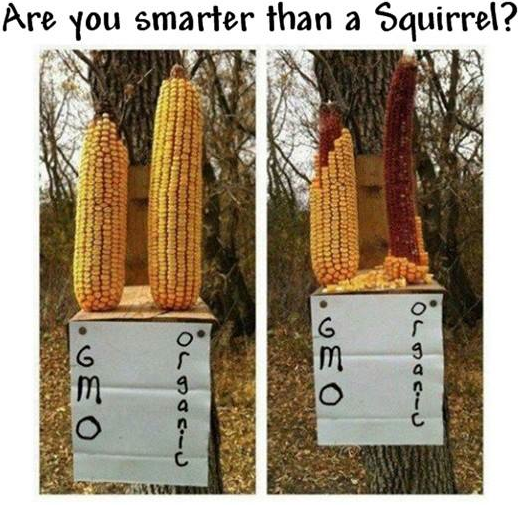GMO foods debate.

mustgetmuscles1
Posts: 3,346 Member
0
Replies
-
Wins what?
0 -
Omg .. just omg.0
-
Wins what?
Sorry. The debate.
intelligencesquaredus.org/debates/upcoming-debates/item/1161-genetically-modify-food0 -
Oh. Ok.0
-
I added it to my watch later list. Thanks for sharing, and I'm not surprised by who "won" the debate, it will be interesting to see the debate play out though.0
-
Its interesting and educational to watch and the comments blowing up everywhere are enjoyable as well.

Prepare!!! 0
0 -
interesting video. Listening to these people back and forth now so far for an hour and 3 minutes is giving me a headache. I feel like I'm listening to children using big words. :laugh:0
-
Do a search

We did this more than once.0 -
Obviously it wins.
The cop that can produce more food at a higher and more uniform quality, in harsher environments and with no negative points, will logically come out on top against anything that does not have those benefits.
Science works. Simple as that.0 -
FaylinaMeir wrote: »interesting video. Listening to these people back and forth now so far for an hour and 3 minutes is giving me a headache. I feel like I'm listening to children using big words. :laugh:
Thankfully, there's a transcript! (I hate video too)
0 -
herrspoons wrote: »The thing I don't get about GMO protesters is that they miss the fact that we've been genetically modifying crops and animals by selective breeding since we started organised agriculture over 10,000 years ago.
The difference between hybridization and GEing is that the former has very localized effects that are pretty much guaranteed to die out quickly if something goes wrong. With GMOs, the effects are spread across vast geographical areas and virtually impossible to contain if something goes wrong.
And something will, eventually, go wrong, because that's the universe we live in.
It is possible to do GMO in a way that limits the risk of unknown unknowns, but we don't do it that way.
0 -
herrspoons wrote: »The thing I don't get about GMO protesters is that they miss the fact that we've been genetically modifying crops and animals by selective breeding since we started organised agriculture over 10,000 years ago.
The difference between hybridization and GEing is that the former has very localized effects that are pretty much guaranteed to die out quickly if something goes wrong. With GMOs, the effects are spread across vast geographical areas and virtually impossible to contain if something goes wrong.
And something will, eventually, go wrong, because that's the universe we live in.
It is possible to do GMO in a way that limits the risk of unknown unknowns, but we don't do it that way.
That's not necessarily true. You could get a hybrid that is sustainable and quick spreading. With GMO not only do the crops need to pass FDA standards, but also need to pass EPA standards. They don't just modify crops and throw the seeds everywhere.
0 -
Look at the natural homo-sapiens mutation and how quickly it dominated the planet. We can't exactly reverse that either.
We currently adapt to hundreds of naturally occurring flu-virus mutations every year.
Perhaps mutation, both natural and encouraged, is normal.
I want a law that prevents the patenting and owning of genome sequences. Open data all the way, baby!
http://www.sciencemag.org/content/254/5029/184.extract0 -
P.S. find another way to reward genome discoveries other than patent or copyright.0
-
TheCrawlingChaos wrote: »herrspoons wrote: »The thing I don't get about GMO protesters is that they miss the fact that we've been genetically modifying crops and animals by selective breeding since we started organised agriculture over 10,000 years ago.
The difference between hybridization and GEing is that the former has very localized effects that are pretty much guaranteed to die out quickly if something goes wrong. With GMOs, the effects are spread across vast geographical areas and virtually impossible to contain if something goes wrong.
And something will, eventually, go wrong, because that's the universe we live in.
It is possible to do GMO in a way that limits the risk of unknown unknowns, but we don't do it that way.
That's not necessarily true.
There are very few things in this world that are "necessarily" true. Argue the general case, not the exception.
And there are no FDA standards that cover the long term, or unknown unknows.
0 -
-
There are bills that protect the makers of genetically engineered crops (at least in the us) from some of the consequences that would otherwise happen if their crops say, were later found to cause cancer. The passage of those bills cost money and they cost reputation as well. Those costs would not have been incurred if it was not believed that those bills would save money in the long run.0
-
I watched the whole thing. I agree with Bill Nye. I do believe that GMOs may end up destroying ecosystems. If they are going to have to make new generations of GMOs every 5 years, there's a big chance of something going wrong in the near future. The long term effects are not known. Selective breeding between plants is one thing but using DNA from spiders, scorpions, and fish is another matter entirely.0
-
herrspoons wrote: »Pretty much. You can destroy an evolutionary niche for a native species of plant or animal by introducing a better adapted species very quickly. Although not food, the displacement of red squirrels by grey squirrels in the UK is an example.
Sure. But is that a bad thing? Or good? Or should we even really care either way?0 -
Let's not forget "terminator seeds". GMO's are less likely randomly take over an ecosystem, since they are sterile.
0 -
FunkyTobias wrote: »Let's not forget "terminator seeds". GMO's are less likely randomly take over an ecosystem, since they are sterile.
Sterility is not guaranteed. We are now finding spreading fields of GMO wheat on the west coast, despite the trials having ended ~20 years ago on a product that never went into production. That wasn't supposed to happen.
0 -
FunkyTobias wrote: »Let's not forget "terminator seeds". GMO's are less likely randomly take over an ecosystem, since they are sterile.
It's also not that they take over a ecosystem but they damage it. Say they kill off all the earth worms, butterflies, and bees in an area. What happens then to the minerals in the soil and the pollination of all the plants?
0 -
i think GMOs are a terrible idea by and large. for example, roundup ready corn. they plant the seeds, plant grows, spray with roundup. the corn plants survive, but your corn cobs now likely have roundup in them, having been absorbed from the most recent application.
another reason why i don't like GMOs. farmer A sells organic food from heritage seed. farmer B sells GMO plants of the same type. if farmer B's seed blows into farmer A's field, Monsanto can sue farmer A for using a copyrighted product.. meanwhile what SHOULD happen is farmer A should be able to sue monsanto for contaminating his crop, it can no longer be organic until all traces of GMO crap is removed. it's *kitten* backwards.
other GMO ideas are things like butterfly-repellant produce which won't be susceptible to cabbage butterflies, for example. these plants would also have a detrimental effect on the populations of other pollenators, which we are quickly running short on.
we're really missing the forest for the trees and the worst part of it is, my country does not require labelling. i'd make better choices if i could, but i've no idea which is better than which.0 -
I ended up listening to the debate on the intelligence squared podcast. It wasn't as informative as I was hoping. I felt like the pro-GMO side won only by default because the anti-GMO side was so poor at arguing their case. Would have preferred to see a more solid victory but when most of the arguments are "scientific consensus supports us, read the literature, look at the studies, GM shouldn't even be up for debate" I got bored with their so-called arguments quickly. It just seemed like they were talking to peers and not to a general public that is not going to comb through 30 years of "research" and "literature" that they don't understand to see if the pro-GMO side is bluffing or not.
Dumb debate, both sides were useless, imo.0 -
i think GMOs are a terrible idea by and large. for example, roundup ready corn. they plant the seeds, plant grows, spray with roundup. the corn plants survive, but your corn cobs now likely have roundup in them, having been absorbed from the most recent application.
another reason why i don't like GMOs. farmer A sells organic food from heritage seed. farmer B sells GMO plants of the same type. if farmer B's seed blows into farmer A's field, Monsanto can sue farmer A for using a copyrighted product.. meanwhile what SHOULD happen is farmer A should be able to sue monsanto for contaminating his crop, it can no longer be organic until all traces of GMO crap is removed. it's *kitten* backwards.
other GMO ideas are things like butterfly-repellant produce which won't be susceptible to cabbage butterflies, for example. these plants would also have a detrimental effect on the populations of other pollenators, which we are quickly running short on.
we're really missing the forest for the trees and the worst part of it is, my country does not require labelling. i'd make better choices if i could, but i've no idea which is better than which.
If you're implying that organic farmers do not use pesticides and herbicide, that is patently wrong. There are several non-synthetic products approved by the USDA and other country's equivalent departments that they can and do use.
I don't think that the lawsuit thing is as simple as that. The one case that usually gets cited when this is brought up was the case were a guy got sued because he said seeds were blown onto his field, but it was CLEARLY not that. By the percentages of his field there was no question he was stealing the seeds and planting them on his own. Nearby farms ARE allowed to have trace amounts of the patented seeds that should account for drifting crops. In all, there were very few cases where cases of Monsanto has gone to trial over this.
As far as the losing the "organic" status, depending on the country, organic farms are allowed to have those trace amounts in their crops without losing the organic certification. The worst that has happened as far as i've been able to find is that there have been cases of rejected shipments due to contamination, but no cases of losing the organic certification.
0 -
 -1
-1 -
BeckyNaturoMommy wrote: »

I love how people use this picture as a "ZOMG GMO IS DA DEBBUL!!!!" point.
I could literally set this picture up in my yard in under five minutes. There is absolutely nothing scientific about it whatsoever, and it only leads to more baseless sensational claims.0 -
They have created round ready crops so they can put 10 times more round up on the crops and the crops wont die. That means your eating 10 times more round up on your food, and the drinking water is full of this chemical. Have your urine tested, you probably have round up in it too. What about the environment? Who does the the testing? The companies that make millions selling chemicals. Do you want chemical companies owning the seeds....the worlds food supply....0
-
I just came in here to express how THRILLED I am to see a discussion about GMO products that isn't ZOMG if you eat them you'll get cancer and mutate in to a fish and die!
I have serious concerns about environmental impact and regulation of GMO crops, but throwing the baby out with the bathwater is taking things too far.0 -
In Oz cotton farmers started using GM cotton that was glyphosate resistant so they could spray directly on the crop to kill the weeds underneath without killing the cotton. It worked! The problem came when the pollen from the GM cotton hybridised with the weeds on the perimeter of the fields. Now the cotton farmers have weeds that are no longer controllable by glyphosate and they have to rely on other (more harmful) weed control.
Then we have the situation that a non-GM farmer had his non-GM crop polluted by pollen from an adjoining farmer's GM crop. He can no longer save his own seed like he has done for many years because, not only is his seed no longer GM free, but a rapacious multi-national wants to charge him royalties because "their" genes are present in his crop.
GM is being rushed into place without sufficient checks so that as much money can be made as possible before the world becomes aware of any negatives. When the claims start, the companies making the money will deny them forever. Only the lawyers win.
If we are going to use GM, we must be 1,000% certain that bio-safety, bio-security and legalities are rock solid. And, if we look to history, that will be a long time coming.0
This discussion has been closed.
Categories
- All Categories
- 1.4M Health, Wellness and Goals
- 398K Introduce Yourself
- 44.6K Getting Started
- 261.1K Health and Weight Loss
- 176.4K Food and Nutrition
- 47.7K Recipes
- 233K Fitness and Exercise
- 461 Sleep, Mindfulness and Overall Wellness
- 6.5K Goal: Maintaining Weight
- 8.7K Goal: Gaining Weight and Body Building
- 153.4K Motivation and Support
- 8.4K Challenges
- 1.4K Debate Club
- 96.5K Chit-Chat
- 2.6K Fun and Games
- 4.7K MyFitnessPal Information
- 16 News and Announcements
- 19 MyFitnessPal Academy
- 1.5K Feature Suggestions and Ideas
- 3.2K MyFitnessPal Tech Support Questions
 https://www.youtube.com/watch?v=S7iLPJMEkiU
https://www.youtube.com/watch?v=S7iLPJMEkiU
















